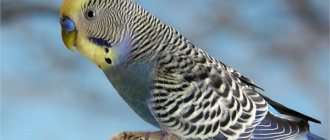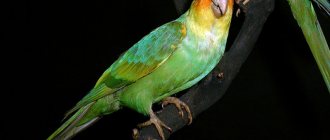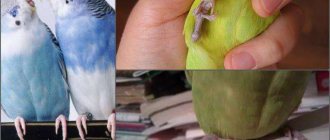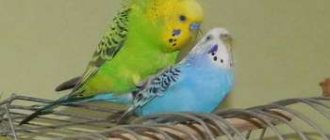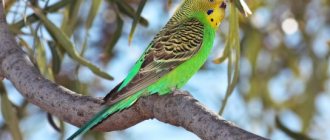To uninitiated people, the singing of budgies may seem like meaningless bird chatter. After all, parrots are not the usual dogs or cats, whose habits have long been studied and understood. However, they are the same living beings, having their own preferences, individual character and even personal opinion. With the help of bird trills and a special behavior characteristic of a particular case, a parrot can tell its owner about its needs, the joy of meeting a person, or, conversely, express dissatisfaction.
After reading the article, you will learn how to decipher bird language and learn to better understand your pet. You will also be able to see with your own eyes all the variety of dances and hear what sounds parrots are capable of making while living side by side with humans.
Singing budgerigars
All the names of budgies are in one way or another connected with the words “noisy”, “singing”. This is explained by their special love to chat, sing, make noise, which is what they do all day long. The approach of the flock can be heard from afar, even before it appears on the horizon.
Interesting! Parrots produce a whole range of sounds from screams and chirps to melodious trills, but most owners do not understand what the bird wants to say with its singing. In fact, everything is extremely simple - you need to watch the parrot, listen with what speed, volume, intonation it sings this or that song or pronounces individual sounds.
In their natural environment, parrots live in pairs. Singing for them is a kind of roll call so that the partner does not get lost in the pack. With the help of chirping, they call their offspring in different tones, pronouncing “chivik.” Each bird has a personal designation akin to a person’s name, so the chicks understand perfectly well that their parents are addressing them and fly to the call.
In the morning, the birds hold something like a meeting about where the flock will go today. Budgerigars scream loudly, scream in every possible way, the noise is several times greater than the warm-up of an instrumental brass band. Then the flock soars up in an instant, the tonality of the budgies' chirping changes to a calm, everyday melody.
When the mating season begins, parrots coo in a particularly quiet, gentle way. Similar behavior is observed both in already formed couples and in single male budgerigars, who try to attract the attention of the females they like with romantic songs. The male sings the same songs to the female who is incubating the eggs.
Reasons for a parrot's silence
Such bird behavior is typical when there is a change in environment, internal experiences or deterioration in health. Before looking for ways to solve the problem, you need to find out why the parrot is silent and does not tweet.
Adaptation to a new place
If a feathered friend has just appeared in the house, there is no need to worry. The first days the bird will be wary and quiet. Appetite may decrease and food will be taken with caution.
Moving or changing ownership is a serious stress for a bird. This condition is sometimes accompanied by intestinal upset. The more activity there is in the new home, the quieter and more inconspicuous the parrot will behave.
The adaptation period lasts approximately 2–4 weeks. During this time, the pet will get used to the new environment, get used to the people, smells and sounds around it.
Character traits
Even among birds there are melancholic people. They observe, take in information, but do not show their temperament. Like true introverts, they are irritated by noise, screaming children, and other pets. Such individuals require more attention and time to establish contact.
Girlish "difficulties"
Females have a more silent and distrustful character, in contrast to active, inquisitive males. Like any girl, hormonal changes can cause sudden mood swings. Today she chirps cheerfully and jumps briskly around the cage, but tomorrow the parrot no longer chirps, sits in one place, going on a “hunger strike”.
Longing from loneliness
In the wild, parrots live in flocks. A bird isolated in captivity suffers greatly if it spends a lot of time in silence and without toys. When keeping a pair of individuals, domestication and speech learning are significantly accelerated.
Loneliness can cause severe depression. It causes self-plucking syndrome. If measures are not taken, the bird may accidentally damage veins or arteries and die.
Old age
An unscrupulous seller may pass off an older bird as a young one. This explains why the parrot doesn't chirp. For small species, 8–10 years is a significant period. During this period of life, they are already inactive, rarely make sounds, and learning to speak is not possible.
My mood has gone bad
Health is normal, but for some reason the parrot does not chirp. A pet may be silent for several days and this is not necessarily some kind of alarming symptom. This behavior is typical during the off-season. By nature, parrots are quite changeable. Don't be upset if he's just not in the mood.
The parrot is sick
Take a closer look at the bird; perhaps the reason for its silence lies in its poor health. Symptoms of illness:
- the pet has refused food and water and does not respond to treats;
- apathy and lethargy appear;
- nasal discharge is observed;
- there is a cough;
- the parrot has stopped chirping and is constantly sleeping;
- the plumage has faded, the wings are drooping;
- the stool has changed;
- the bird itches all the time;
- the wax has changed color or structure;
Why do birds dance and sing?
Parrots are known as avid music lovers. Moreover, individuals living together may have completely different musical preferences. What kind of music a particular budgie will like and become a favorite will depend on its temperament and character. So, some prefer the sounds of an instrumental orchestra, while other budgies like songs that have vocal accompaniment. The bird sings along with the performer, imitating intonation, repeating individual words, thereby expanding its vocabulary.
Interesting! Most budgies do not like listening to club music or techno music. The bird becomes aggressive and can scream and flap its wings.
Many owners report that their pets, in addition to singing, love to dance, and this activity completely captivates them for several hours. Parrots really have a sense of rhythm, they move well to the beat of the music: they rhythmically wave their heads and wings, dancing and moving their paws.
It is difficult to reliably explain the fact that parrots are addicted to music, singing and dancing. Scientists have helped bring some clarity by finding nuclei in their brains responsible for learning, which no other bird has. These are isolated groups of neurons that help parrots remember and later reproduce sounds. They are closely adjacent to the motor centers of the brain, which allows the speech center to control the movement of the tongue, and at the same time the rest of the bird’s body. Regarding what kind of music budgerigars like, a close relationship has been discovered between the preferences of the pet and its owner.
Sounds of budgies
Various sounds in the repertoire of budgies change their meaning when intonation changes. But an attentive owner will easily understand what his pet wants to say with his singing, and a kind of short bird language translator presented below will help him with this.
- If there are any changes in the appearance of the owner or in the room where the bird is located, and the parrot notices them, he will express surprise by repeating the cry “piu”.
- The feathered one, dissatisfied with the innovations, repeats “quaw” sharply and loudly for a long time.
- The incessant cheerful singing of the chivi-chivi bird indicates that it is interested in something unfamiliar to it or is doing something that is forbidden. For example, he damages furniture, wallpaper, or tries to chew through a wire.
- The sounds of “cha-cha” pronounced in a loud, harsh voice mean that the bird is scared. They, said with a calmer intonation, speak of the parrot’s high spirits. If the sound becomes more intense and louder, then the bird wants to be let out of the cage for a walk.
- The bird uses the “pichi” call when it seeks communication with other birds it sees outside the window or sitting nearby in a cage. Calm singing is most likely addressed to a person or other pet.
- A gusty, loud “pitii-pitii” whistle heard from a budgerigar can mean dissatisfaction. At this moment, the parrot quickly walks around the cage, spreading its wings. Translated from his language, this indicates that the bird was disturbed or, conversely, little attention was paid.
- The chirping of “chak-chwa” parrots is nothing more than a joyful greeting to a person or pet.
- If a budgie constantly interrupts its songs with a sharp “pity”, this means that something is bothering or irritating the bird, and it needs to be removed from the cage. It can also mean that the parrot is hungry. He will shout out his demand until the owner stops what he is doing and pays attention to the bird.
- A budgie that is forcibly held in the hands or frightened screams “kweee” heart-rendingly.
- In the evening, sitting in the cage, the parrot will switch to a peaceful, increasingly quiet “kwe”, which, translated from bird language, means that it is time to go to bed.
Diseases
A situation that explains why a budgerigar is trembling and clucking, and the droppings are liquid, can be a disease. The presence of the following symptoms indicates that your pet needs to be seen by a doctor as soon as possible:
A thorough examination of the pet will help you understand why your budgerigar is trembling and pressing its paw. The reason may be hidden in the presence of injury or some other damage. Every breeder should know that if, in addition to trembling, the pet exhibits at least one of the above symptoms, it must be taken to the veterinarian as soon as possible.
Summarizing
A budgie, like any other pet, requires sufficient time and attention from its owner. If the owner is patient and regularly works with his pupil, then soon the training will bear fruit - the bird will speak, repeating not only individual words, but also entire sentences. He will copy intonation, surrounding sounds, and delight family members with dancing and cheerful singing.
An attentive owner who has studied the habits of a feathered pet will be able to find a common language with it. This will make it comfortable for both the bird, whose needs will be understood and satisfied, and the owner, who can quickly determine by the behavior and singing of the budgerigar his emotional state, the cause of anxiety or joy.
